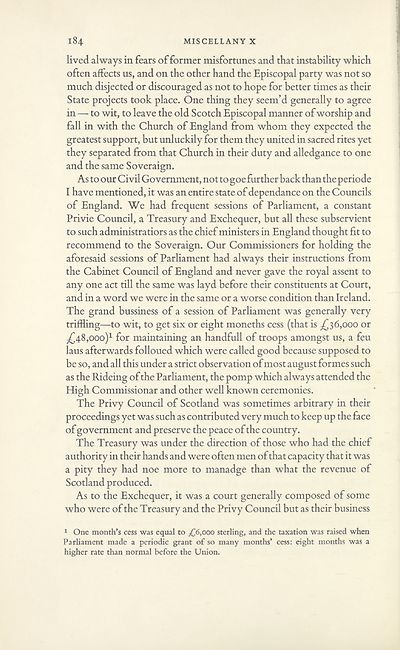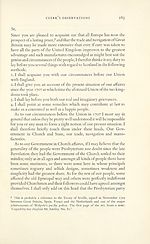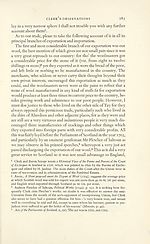Series 4 > Miscellany of the Scottish History Society
(209) Page 184
Download files
Complete book:
Individual page:
Thumbnail gallery: Grid view | List view

MISCELLANY X
184
lived always in fears of former misfortunes and that instability which
often affects us, and on the other hand the Episcopal party was not so
much disjected or discouraged as not to hope for better times as their
State projects took place. One thing they seem’d generally to agree
in — to wit, to leave the old Scotch Episcopal manner of worship and
fall in with the Church of England from whom they expected the
greatest support, but unluckily for them they united in sacred rites yet
they separated from that Church in their duty and alledgance to one
and the same Soveraign.
As to our Civil Government, not to goe fur ther back than the periode
I have mentioned, it was an entire state of dependance on the Councils
of England. We had frequent sessions of Parliament, a constant
Privie Council, a Treasury and Exchequer, but all these subservient
to such administratiors as the chief ministers in England thought fit to
recommend to the Soveraign. Our Commissioners for holding the
aforesaid sessions of Parliament had always their instructions from
the Cabinet Council of England and never gave the royal assent to
any one act till the same was layd before their constituents at Court,
and in a word we were in the same or a worse condition than Ireland.
The grand bussiness of a session of Parliament was generally very
triffling—to wit, to get six or eight moneths cess (that is ^36,000 or
.^SjOOo)1 for maintaining an handfull of troops amongst us, a feu
laus afterwards folloued which were called good because supposed to
be so, and all this under a strict observation of most august formes such
as the Rideing of the Parliament, the pomp which always attended the
High Commissionar and other well known ceremonies.
The Privy Council of Scotland was sometimes arbitrary in their
proceedings yet was such as contributed very much to keep up the face
of government and preserve the peace of the country.
The Treasury was under the direction of those who had the chief
authority in their hands and were often men of that capacity that it was
a pity they had noe more to manadge than what the revenue of
Scotland produced.
As to the Exchequer, it was a court generally composed of some
who were of the Treasury and the Privy Council but as their business
1 One month’s cess was equal to £6,000 sterling, and the taxation was raised when
Parliament made a periodic grant of so many months’ cess: eight months was a
higher rate than normal before the Union.
184
lived always in fears of former misfortunes and that instability which
often affects us, and on the other hand the Episcopal party was not so
much disjected or discouraged as not to hope for better times as their
State projects took place. One thing they seem’d generally to agree
in — to wit, to leave the old Scotch Episcopal manner of worship and
fall in with the Church of England from whom they expected the
greatest support, but unluckily for them they united in sacred rites yet
they separated from that Church in their duty and alledgance to one
and the same Soveraign.
As to our Civil Government, not to goe fur ther back than the periode
I have mentioned, it was an entire state of dependance on the Councils
of England. We had frequent sessions of Parliament, a constant
Privie Council, a Treasury and Exchequer, but all these subservient
to such administratiors as the chief ministers in England thought fit to
recommend to the Soveraign. Our Commissioners for holding the
aforesaid sessions of Parliament had always their instructions from
the Cabinet Council of England and never gave the royal assent to
any one act till the same was layd before their constituents at Court,
and in a word we were in the same or a worse condition than Ireland.
The grand bussiness of a session of Parliament was generally very
triffling—to wit, to get six or eight moneths cess (that is ^36,000 or
.^SjOOo)1 for maintaining an handfull of troops amongst us, a feu
laus afterwards folloued which were called good because supposed to
be so, and all this under a strict observation of most august formes such
as the Rideing of the Parliament, the pomp which always attended the
High Commissionar and other well known ceremonies.
The Privy Council of Scotland was sometimes arbitrary in their
proceedings yet was such as contributed very much to keep up the face
of government and preserve the peace of the country.
The Treasury was under the direction of those who had the chief
authority in their hands and were often men of that capacity that it was
a pity they had noe more to manadge than what the revenue of
Scotland produced.
As to the Exchequer, it was a court generally composed of some
who were of the Treasury and the Privy Council but as their business
1 One month’s cess was equal to £6,000 sterling, and the taxation was raised when
Parliament made a periodic grant of so many months’ cess: eight months was a
higher rate than normal before the Union.
Set display mode to:
![]() Universal Viewer |
Universal Viewer | ![]() Mirador |
Large image | Transcription
Mirador |
Large image | Transcription
Images and transcriptions on this page, including medium image downloads, may be used under the Creative Commons Attribution 4.0 International Licence unless otherwise stated. ![]()
| Scottish History Society volumes > Series 4 > Miscellany of the Scottish History Society > (209) Page 184 |
|---|
| Permanent URL | https://digital.nls.uk/126695391 |
|---|
| Description | Over 180 volumes, published by the Scottish History Society, containing original sources on Scotland's history and people. With a wide range of subjects, the books collectively cover all periods from the 12th to 20th centuries, and reflect changing trends in Scottish history. Sources are accompanied by scholarly interpretation, references and bibliographies. Volumes are usually published annually, and more digitised volumes will be added as they become available. |
|---|


